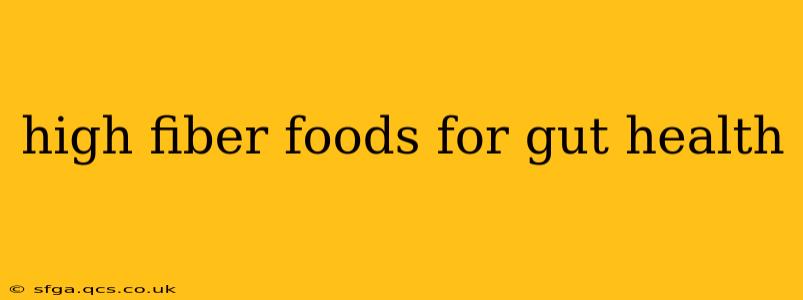Maintaining a healthy gut is crucial for overall well-being. A diverse and thriving gut microbiome contributes to everything from robust immunity to stable mood and efficient digestion. One key element in supporting this ecosystem? Fiber. This essential nutrient acts as prebiotic fuel, feeding the beneficial bacteria in your gut and promoting a balanced environment. Let's delve into some of the best high-fiber foods to incorporate into your diet for optimal gut health.
What are the benefits of high-fiber foods for gut health?
Fiber is a type of carbohydrate the human body can't digest. This indigestible nature is precisely what makes it so beneficial for gut health. There are two main types of fiber: soluble and insoluble.
- Soluble fiber: Dissolves in water, forming a gel-like substance that slows digestion, regulates blood sugar, and feeds beneficial gut bacteria.
- Insoluble fiber: Doesn't dissolve in water and adds bulk to your stool, promoting regularity and preventing constipation.
Both types are essential for a healthy gut. The benefits of consuming high-fiber foods include:
- Improved digestion: Fiber adds bulk to stool, making it easier to pass and preventing constipation.
- Enhanced nutrient absorption: A healthy gut microbiome aids in the absorption of essential vitamins and minerals.
- Boosted immunity: The gut is a central player in the immune system, and a healthy gut microbiome strengthens immune function.
- Reduced risk of chronic diseases: Studies link high-fiber diets to a lower risk of conditions like type 2 diabetes, heart disease, and certain cancers.
- Better weight management: High-fiber foods tend to be more filling, leading to reduced calorie intake and improved weight control.
What are some examples of high-fiber foods?
Numerous delicious and nutritious foods are packed with fiber. Here’s a breakdown categorized for easier incorporation into your diet:
Fruits:
- Avocados: These creamy fruits are surprisingly high in fiber, providing both soluble and insoluble types.
- Bananas: Especially when slightly unripe, bananas are a good source of resistant starch, a type of fiber that acts as prebiotic.
- Raspberries: These berries are bursting with fiber, antioxidants, and other beneficial nutrients.
- Apples: With both soluble and insoluble fiber, apples promote both regularity and healthy gut bacteria growth. (Remember to eat the skin for maximum fiber!)
- Pears: Similar to apples in fiber content and benefits.
Vegetables:
- Broccoli: This cruciferous vegetable is a powerhouse of fiber, vitamins, and minerals.
- Brussels sprouts: Another cruciferous vegetable high in fiber and beneficial compounds.
- Sweet potatoes: These nutrient-rich vegetables offer a good amount of fiber, along with vitamins and antioxidants.
- Carrots: While not as high as some other vegetables, carrots still contribute to your daily fiber intake.
- Legumes: Lentils, beans (kidney, black, pinto, etc.), and chickpeas are excellent sources of both soluble and insoluble fiber.
Grains & Seeds:
- Oats: Particularly rolled oats, are a great source of soluble fiber, known as beta-glucan.
- Whole wheat bread: Opt for whole grain versions over refined white bread for significantly more fiber.
- Quinoa: This complete protein is also a good source of fiber.
- Chia seeds: These tiny seeds are incredibly high in fiber, along with omega-3 fatty acids.
- Flax seeds: Similar to chia seeds in their fiber and nutrient profile.
Nuts & Seeds:
- Almonds: A handful of almonds provides a healthy dose of fiber and healthy fats.
- Walnuts: These nuts offer both fiber and omega-3 fatty acids.
- Pumpkin seeds: A great source of fiber, magnesium, and zinc.
How much fiber should I eat per day?
The recommended daily fiber intake varies depending on age and sex, but generally, adults should aim for 25-30 grams per day. Gradually increase your fiber intake to avoid digestive discomfort. Drinking plenty of water is crucial when increasing fiber consumption to help prevent constipation.
What are the potential side effects of too much fiber?
While fiber is generally beneficial, consuming excessive amounts can sometimes lead to side effects like bloating, gas, and diarrhea. It's important to increase fiber intake gradually to allow your gut microbiome to adjust.
Can I take fiber supplements?
Fiber supplements, like psyllium husk or methylcellulose, can be helpful for those struggling to meet their daily fiber needs through diet alone. However, it's always best to prioritize whole foods as the primary source of fiber. Always consult a doctor before starting any new supplements.
What if I have a medical condition that affects my gut?
If you have a digestive condition like irritable bowel syndrome (IBS), Crohn's disease, or ulcerative colitis, it's crucial to discuss your fiber intake with your doctor or a registered dietitian. They can help you determine the appropriate amount of fiber for your specific needs and recommend suitable high-fiber foods. Specific fiber types might be more or less beneficial depending on your individual condition.
By incorporating a variety of high-fiber foods into your diet, you can significantly improve your gut health, promoting a balanced microbiome and overall well-being. Remember to increase fiber gradually and stay hydrated for optimal results. Consult with a healthcare professional if you have any concerns about your gut health or dietary needs.
